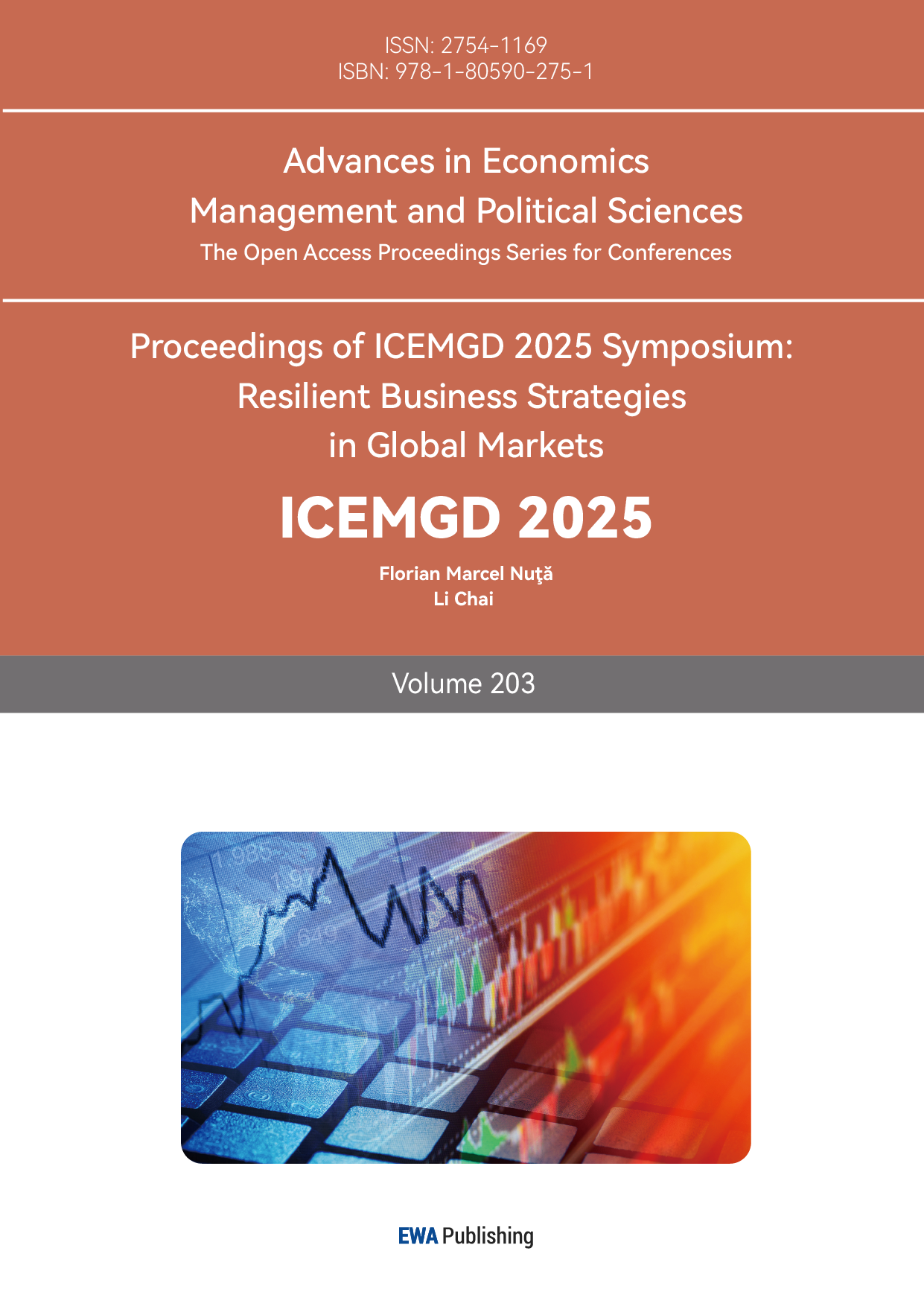References
[1]. WANG Xiu-hua, LIU Na. Exploration of long-term mechanism for sustainable development of green finance in China [J]. Theory Exploration, 2016, (04): 99-105.
[2]. WANG Family, SHENG Nan. Digital Transformation to Promote Green Innovation of Enterprises-Analysis Based on Information Effect, Resource Effect and Technology Effect [J]. Journal of Beijing Institute of Technology (Social Science Edition), 2024, 24(05): 113-130.
[3]. Dai Lina, Wei Yuige. Research on the impact of digital economy on green innovation capacity of Chinese cities--an analysis of the mediating effect based on capital aggregation [J]. Business Economy, 2025, (01): 34-37.DOI: 10.19905/j.cnki.syjj1982.2025.01.048.
[4]. ZHAO Chenyu, WANG Wenchun, LI Xuesong. How digital transformation affects enterprise total factor productivity [J]. Finance and Trade Economics, 2021, 42(07): 114-129.DOI: 10.19795/j.cnki.cn11-1166/f.20210705.001.
[5]. YANG Shuigen, HE Songtao. Impact of digital economy on sustainable development and its coupling relationship--an empirical analysis based on city clusters in the middle reaches of the Yangtze River [J]. East China Economic Management, 2023, 37(05): 73-84.DOI: 10.19629/j.cnki.34-1014/f.221015006.
[6]. LIU Chang, PAN Huifeng, LI Pei, et al. Research on the impact and mechanism of digital transformation on green innovation efficiency of manufacturing enterprises [J]. China Soft Science, 2023, (04): 121-129.
[7]. QI Huaijin, CAO Xiuqin, LIU Yanxia. The impact of digital economy on corporate governance - based on the perspective of information asymmetry and irrational behavior of managers [J]. Reform, 2020, (04): 50-64.
[8]. Li Huiyun, Liu Qianying, Li Shuyi, et al. Environmental, social and governance disclosure and corporate green innovation performance [J]. Statistical Research, 2022, 39(12): 38-54.DOI: 10.19343/j.cnki.11-1302/c.2022.12.003.
[9]. QIAN Juan, ZHANG Lunpin, ZHANG Xiaoyang. Digital transformation and corporate energy efficiency - and the role of ESG performance as an enabler [J/OL]. Finance Theory and Practice, 2024, (12): 59-71 [2025-02-22].http: //kns.cnki.net/kcms/detail/41.1078.F.20250219.1509.010.html.
[10]. Jun Huang, Wenxin Song. Digital Transformation, Firm Lifecycle and Breakthrough Innovation-Empirical Evidence from Chinese Listed Companies [J]. Shanghai Economic Research, 2023, (01): 48-69.DOI: 10.19626/j.cnki.cn31-1163/f.2023.01.003.
[11]. KOU Dongxue, ZHANG Caiyun, ZHANG Xiaoxi. The way of enterprise digitalization empowering enterprise green transformation: from information disclosure to innovation drive [J]. Journal of Beijing Institute of Technology (Social Science Edition), 2024, 24(02): 48-66.
[12]. CHEN Su-Mei, LI Xiao-Hua. Role mechanism of digital economy driving green development of manufacturing industry [J]. Enterprise Economy, 2022, 41(12): 140-150.DOI: 10.13529/j.cnki.enterprise.economy.2022.12.015.
[13]. WANG Yao, FENG Xiaoqing, HOU Deshuai. Can Corporate Digital Transformation Improve Analyst Forecasting Accuracy - Based on the Dual Perspective of Information Disclosure and Information Mining [J]. Journal of Zhongnan University of Economics and Law, 2023, (04): 16-27+135.DOI: 10.19639/j.cnki.issn1003-5230.20230130.003.
[14]. Guo Feng, Yang Shangguang, Chai Zeyang. Does enterprise digital transformation promote the "incremental improvement" of green technology innovation? --A textual analysis based on annual reports of Chinese listed companies [J]. Southern Economy, 2023, (02): 146-162.DOI: 10.19592/j.cnki.scje.400349.
[15]. Zhuang Yumin, Chu Qingqing. Financial agglomeration, industry-university-research cooperation and regional innovation [J]. Finance and Trade Economics, 2021, 42(11): 68-84.DOI: 10.19795/j.cnki.cn11-1166/f.20211108.010.
[16]. Lv Kefu, Yu Mingyang, Ruan Yongping. Enterprise digital transformation and resource allocation efficiency [J]. Research Management, 2023, 44(08): 11-20.DOI: 10.19571/j.cnki.1000-2995.2023.08.002.
[17]. Li WT. Digital technology, industry shock and corporate decision making [D]. Xiamen University, 2021.DOI: 10.27424/d.cnki.gxmdu.2021.000173.
[18]. CHA Dexin, WU Chuanqing, REN Xiaoyi, et al. How does financial science and technology expenditure affect corporate technological innovation? --Heterogeneity Characteristics, Macro and Micro Mechanisms and Cracking the Government Incentive Structure [J]. China Soft Science, 2020, (03): 171-182.
[19]. WANG Xin, WANG Ying. Research on green credit policy to enhance green innovation [J]. Management World, 2021, 37(06): 173-188+11.DOI: 10.19744/j.cnki.11-1235/f.2021.0085.
[20]. WU Fei, HU Huizhi, LIN Huiyan, et al. Corporate digital transformation and capital market performance-empirical evidence from stock liquidity [J]. Management World, 2021, 37(07): 130-144+10.DOI: 10.19744/j.cnki.11-1235/f.2021.0097.
[21]. TAO Feng, WANG Xinran, XU Yang, et al. Digital transformation, industry chain supply chain resilience and firm productivity [J]. China Industrial Economy, 2023, (05): 118-136.DOI: 10.19581/j.cnki.ciejournal.2023.05.012.
[22]. Lai, W.-J., Cheng, M.-N.. Substantive or strategic innovation? --The impact of macro-industrial policy on micro-firm innovation [J]. Economic Research, 2016, 51(04): 60-73.
[23]. WEN Zhonglin, YE Baojuan. Mediation effects analysis: Methods and model development [J]. Advances in Psychological Science, 2014, 22(05): 731-745.
[24]. X. Zhang, Y. Wang. Effects of environmental regulation and R& D investment on green technology innovation [J]. Science and Technology Progress and Countermeasures, 2017, 34(17): 111-119.



